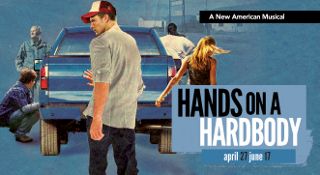THE PAINT JOB ON THIS PROMISING MUSICAL NEEDS DARKER COLORS
NPR’s This American Life is where I first heard about the 1997 film Hands on a Hard Body, which documented a 1995 dealership-sponsored contest in Texas. The rules were simple: whoever could keep their hand on a brand-new pickup truck the longest got the keys; there was a 15-minute break every six hours and a five-minute break every hour; white gloves had to be worn at all times to protect the car, and there was no leaning and no crouching. The theme of Ira Glass’ radio show was “Something-for-Nothing,” and the interviewee was Benny Perkins, a man who had won the truck in a previous 1992 contest and was now set to try his hand(s) at winning another truck.
Among his many fascinating revelations about the contest, the confident and wily Perkins made most clear that winning isn’t about holding onto the truck, it’s about holding onto one’s sanity – that is, if your legs don’t go numb first. Benny also revealed two sides to his nature, both a sympathetic kind of bonding with other participants, and a wickedly competitive drive. It speaks volumes when Benny admitted, “I told Dan, the guy I was with, I said ‘You’re standing next to the devil and this is the ride to hell. I’ll stand here ’til the day you die, so you might as well drop out now.’”
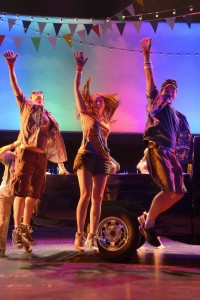 Benny becomes, by default, a quasi-protagonist of the documentary, due to his stamina, lengthy commentary and having won before. Now, in 2012, Benny is a lead character once again in the film’s musical adaptation, also titled Hands on a Hardbody, which had its world premiere over the weekend at La Jolla Playhouse. The broad spectrum of the ten Texan contestants on stage may seem like an unbelievable trick on the part of bookwriter Doug Wright, but they are based directly on those in the documentary, participants who were chosen by random drawing. They include the proud son of Mexican immigrants, a stout, evangelistic woman who has hundreds of people praying for her, a stoic ex-military man, a cigarette-smoking ex-oilrigger, and a bouncy but hard-edged ex-cheerleader.
Benny becomes, by default, a quasi-protagonist of the documentary, due to his stamina, lengthy commentary and having won before. Now, in 2012, Benny is a lead character once again in the film’s musical adaptation, also titled Hands on a Hardbody, which had its world premiere over the weekend at La Jolla Playhouse. The broad spectrum of the ten Texan contestants on stage may seem like an unbelievable trick on the part of bookwriter Doug Wright, but they are based directly on those in the documentary, participants who were chosen by random drawing. They include the proud son of Mexican immigrants, a stout, evangelistic woman who has hundreds of people praying for her, a stoic ex-military man, a cigarette-smoking ex-oilrigger, and a bouncy but hard-edged ex-cheerleader.
But if you think the libretto contains an unlikely mélange of characters, check out the creators. Along with Wright, the lyricist is Amanda Green, who co-composed the music with Trey Anastasio, the frontman and songwriter for the band Phish. I’m happy to report that they are on the right track, but there are some major bumps in the road. Just as with the Nissan truck that sits center stage for the majority of the production, Hardbody looks good and has a motor capable of reaching far destinations, but doesn’t have the fuel it needs to get off the lot. In order to do that, the creators need to dig deeper into the American psyche.
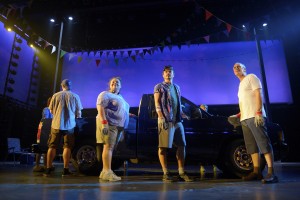 Wright is best-known for his plays Quills and I Am My Own Wife, but he must have learned some lessons penning the books for Grey Gardens and The Little Mermaid, because Hardbody is his best libretto yet. With such a stagnant story, Wright is surprisingly the most successful contributor of the night. His characters, for the most part, are well-drawn and likeable, and his book is fresh, fun, unforced and the main reason why this musical has a hopeful future. Still, there are problems. One is that the musical lacks a central character’s journey: Benny still dominates the drama, but Wright hasn’t decided if the man is a joker or a rogue, protagonist or antagonist; as such, any attempts to make Benny a sympathetic character towards the end are thwarted (nonetheless, a nearly unrecognizable Hunter Foster completely loses himself in the role). Other characters, such as the car dealers, veer towards obvious stereotypes (he’s the womanizer, she’s the racist), and still others remain underdeveloped, such as a young couple who find romance while clutching the truck and dream of hightailing it to California in their new car.
Wright is best-known for his plays Quills and I Am My Own Wife, but he must have learned some lessons penning the books for Grey Gardens and The Little Mermaid, because Hardbody is his best libretto yet. With such a stagnant story, Wright is surprisingly the most successful contributor of the night. His characters, for the most part, are well-drawn and likeable, and his book is fresh, fun, unforced and the main reason why this musical has a hopeful future. Still, there are problems. One is that the musical lacks a central character’s journey: Benny still dominates the drama, but Wright hasn’t decided if the man is a joker or a rogue, protagonist or antagonist; as such, any attempts to make Benny a sympathetic character towards the end are thwarted (nonetheless, a nearly unrecognizable Hunter Foster completely loses himself in the role). Other characters, such as the car dealers, veer towards obvious stereotypes (he’s the womanizer, she’s the racist), and still others remain underdeveloped, such as a young couple who find romance while clutching the truck and dream of hightailing it to California in their new car.
A radio announcer in the play calls the contest a “heart-pounding, white-knuckle battle of wills,” yet there is little tension on stage, and the whole enterprise is fluffier than it should be. By deciding who his central character is, Wright can hopefully have the dramatic arc he needs to rev up the suspense.
It also feels as if Wright doesn’t yet know exactly what the show is about. In order for the audience to truly relate to so many individual dramas, the book needs to focus on the one drama that seems to unite every character on the stage: the death of the American Dream. Instead, we have the show defined by “It’s a Human Drama Thing,” the vague opening number that starts the show off with a whimper.
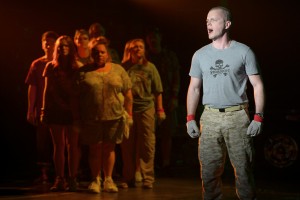 Green contributed uninspired lyrics to High Fidelity and Bring it On: The Musical, but somehow they suited the bubblegum pop/rock themes of those shows. Her lyrics have improved for Hardbody, but still they can safely be called only serviceable. Even in “If I Had A Truck,” where Green shrewdly has contestants tell us why they need to win, I wish her lyrics were craftier, with more insight and intelligence. As for rhyming, what Green may see as clever, I see as distracting: in High Fidelity, she rhymed intervention with frenchin’, and in Hardbody, a character drawls turnip with burn up. This style of lyricism may suit some of her sillier songs performed in New York cabarets, but Hardbody’s characters need to be fleshed-out; greater lyrics will bring them greater dimension. I’ve heard some of her lyrics for non-theater songs, so she is no doubt capable. Only time will tell, but the daughter of Singin’ in the Rain’s Adolph Green may not have a true acumen for writing theater lyrics. My hope is that she will re-invent herself with this project.
Green contributed uninspired lyrics to High Fidelity and Bring it On: The Musical, but somehow they suited the bubblegum pop/rock themes of those shows. Her lyrics have improved for Hardbody, but still they can safely be called only serviceable. Even in “If I Had A Truck,” where Green shrewdly has contestants tell us why they need to win, I wish her lyrics were craftier, with more insight and intelligence. As for rhyming, what Green may see as clever, I see as distracting: in High Fidelity, she rhymed intervention with frenchin’, and in Hardbody, a character drawls turnip with burn up. This style of lyricism may suit some of her sillier songs performed in New York cabarets, but Hardbody’s characters need to be fleshed-out; greater lyrics will bring them greater dimension. I’ve heard some of her lyrics for non-theater songs, so she is no doubt capable. Only time will tell, but the daughter of Singin’ in the Rain’s Adolph Green may not have a true acumen for writing theater lyrics. My hope is that she will re-invent herself with this project.
The music, alas, is generally generic country, inoffensive and unmemorable, with little weight melodically. Certainly acceptable music, had the lyrics been more profound, but the first number to light up the theatre simply because of its music was number nine out of eleven songs in the first act: “Joy of the Lord.” To my knowledge, neither Green nor Anastasio have composed for a book-musical before, yet here they are. The number of producers who give free rein to first-time composers because of their successful pop career is disquieting; the quantity of lousy sensations and flops as the outcome is not so surprising. Most pop composers have extreme difficulty writing for situation and character: Paul Simon/The Capeman, Bono/Spiderman, Jake Shears/Tales of the City, and Glen Ballard/Ghost, to name a few.
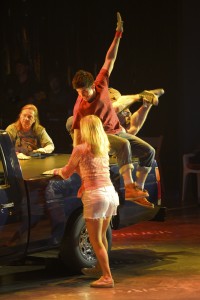 “Used To Be” is the one song that perfectly encapsulates both the strength and weaknesses of the show, and how it can be readily fixed. JD Drew, played with grizzled perfection by Keith Carradine, fell off an oil rig and is physically incapable of working anymore, yet there is no pension to support him and Virginia, his wife of 30 years (Mary Gordon Murray). A decent ballad between the two (“Alone With Me”) already established that the couple is growing apart. Now, well into the contest, an exhausted JD ruminates on how Corporate America has redefined what home means: Wal-Mart and Wendy’s have glutted our cities, making everything look the same, prompting JD to sing the most haunting question of the night: “How do you know when you’re home anymore?” But the song, which should break our hearts, is written with a chorus (just as with pop) that repeats “Wal-Mart” and “Wendy’s” over and over. As it stands, the song is too generic and could use a more plaintive melody. It should not be about how things used to be, but rather about JD’s sense of displacement, given the state of America today and his failing relationship, health and career. On top of that, it’s a perfect chance to shine the irony on an American who bemoans Corporate America, yet is in a contest sponsored by the same beast. (Besides, the song should be retitled, “How Do You Know You’re Home?” because Charlene and Stevie Wonder already had a hit called “Used To Be.”)
“Used To Be” is the one song that perfectly encapsulates both the strength and weaknesses of the show, and how it can be readily fixed. JD Drew, played with grizzled perfection by Keith Carradine, fell off an oil rig and is physically incapable of working anymore, yet there is no pension to support him and Virginia, his wife of 30 years (Mary Gordon Murray). A decent ballad between the two (“Alone With Me”) already established that the couple is growing apart. Now, well into the contest, an exhausted JD ruminates on how Corporate America has redefined what home means: Wal-Mart and Wendy’s have glutted our cities, making everything look the same, prompting JD to sing the most haunting question of the night: “How do you know when you’re home anymore?” But the song, which should break our hearts, is written with a chorus (just as with pop) that repeats “Wal-Mart” and “Wendy’s” over and over. As it stands, the song is too generic and could use a more plaintive melody. It should not be about how things used to be, but rather about JD’s sense of displacement, given the state of America today and his failing relationship, health and career. On top of that, it’s a perfect chance to shine the irony on an American who bemoans Corporate America, yet is in a contest sponsored by the same beast. (Besides, the song should be retitled, “How Do You Know You’re Home?” because Charlene and Stevie Wonder already had a hit called “Used To Be.”)
Director Neil Pepe needs to experiment more and decide what to do about that truck. Clearly, it’s a weak choice theatrically to have hands on the truck at all times. The 15-minute breaks allow characters to leave the car, and some actors do have songs away from the truck (demarcated by Kevin Adams’ lighting), but songs and dialogue occur willy-nilly with hands on and off that neon-blue pickup, which, to be honest, becomes a tiring stage picture. Pepe did put the car on ball-bearings so actors can push it around the stage or rotate it (scenic design by Christine Jones), but this is a musical, for crying out loud, and begs to be opened up even more.
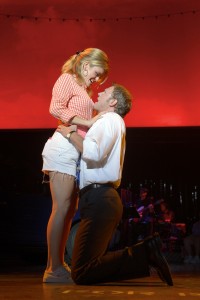 As it stands, Benjamin Millepied’s “musical staging” is weak when actors use their hands to grapevine around the car, but showed strength in the aforementioned gospel number, “Joy of the Lord,” which used two actors to buck their legs high in the air while grasping the truck. With a good amount of corpulent and aged characters, I’m fascinated to see what Pepe and Millepied can do to solve the staging. What if all the songs were done off the truck and all the dialogue was delivered from the truck? Who knows?
As it stands, Benjamin Millepied’s “musical staging” is weak when actors use their hands to grapevine around the car, but showed strength in the aforementioned gospel number, “Joy of the Lord,” which used two actors to buck their legs high in the air while grasping the truck. With a good amount of corpulent and aged characters, I’m fascinated to see what Pepe and Millepied can do to solve the staging. What if all the songs were done off the truck and all the dialogue was delivered from the truck? Who knows?
I truly believe the staging could be resolved if the writers were to ensure that the contest becomes a life-defining moment for the characters. While the audience is left breathless by a some of the dropouts, it’s positively anti-climactic when other contestants remove their hands from the car. The creators now must plumb the depths of the American soul, make the show darker, and stray further from their source material. The creators actually got the original contestants from the film to give consent to use their name and story – with a small financial stake in the musical, should it go on to Broadway. The biggest issue for me is that the creative team seems more concerned with honoring the original contestants than they are in truly breaking ground in American Musical Theater.
According to the Associated Press, it turns out that the contest was discontinued in 2005 because one contestant, Richard Thomas Vega II, crossed a street, broke into a Kmart store, took a gun from a case and shot himself. His wife sued and settled in 2008 with Patterson Nissan of Longview, Texas. She alleged that the dealership was negligent in organizing and conducting the contest and likened the stress and sleep deprivation to “brainwashing,” adding that the dealership failed to provide a safe environment for contestants who “temporarily lost their sanity.” In the musical, when a somnambulant participant wanders off towards the highway, the lack of supervision at the dealership was not satisfactorily addressed, and took me out of the play.
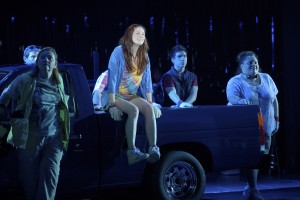 OK, the suicide may have happened at another contest, but what if it had happened in this musical? Take a risk! Do you have to be Sondheim to have a character put a gun to his head? What if it’s just attempted suicide, after which the guy has an epiphany that most Americans need to hear: “Maybe it’s my materialism that is killing me.” Good grief, what a wasted opportunity! America is starving for a great story, not another pop-driven, family-friendly musical.
OK, the suicide may have happened at another contest, but what if it had happened in this musical? Take a risk! Do you have to be Sondheim to have a character put a gun to his head? What if it’s just attempted suicide, after which the guy has an epiphany that most Americans need to hear: “Maybe it’s my materialism that is killing me.” Good grief, what a wasted opportunity! America is starving for a great story, not another pop-driven, family-friendly musical.
Host Ira Glass summed up his “Something-For-Nothing” program thusly: “This is the thing about something-for-nothing schemes. Once you get the details, once you get involved, it’s not something for nothing. You pay. One way or another, you pay. And we all know that. But even though we all know that, we just want to believe.” Even though Hands on a Hardbody rarely takes off, it’s on the right track, a phenomenon rarely seen in new musicals written by pop-song writers. I want to believe that this unlikely collaborative trio can tap into the universal themes that the musical currently skirts, and tweak their material in such a way that it effects our heart, mind and spirit.
photos by Kevin Berne
Hands on a Hardbody
La Jolla Playhouse (Regional Theater)
scheduled to end on June 17
for tickets, call 858.550.1010 or visit http://www.lajollaplayhouse.org
